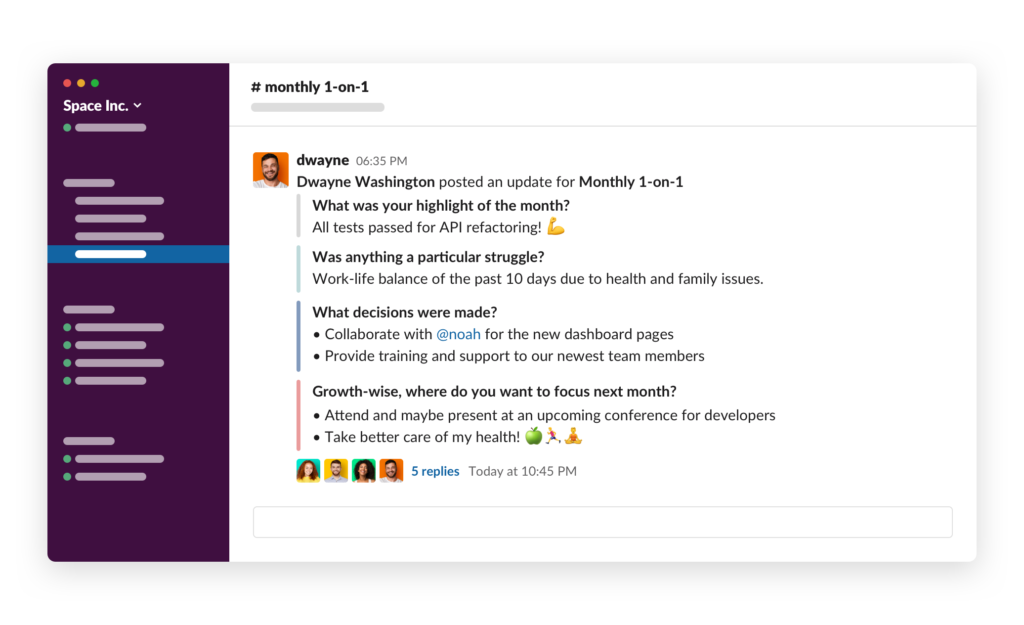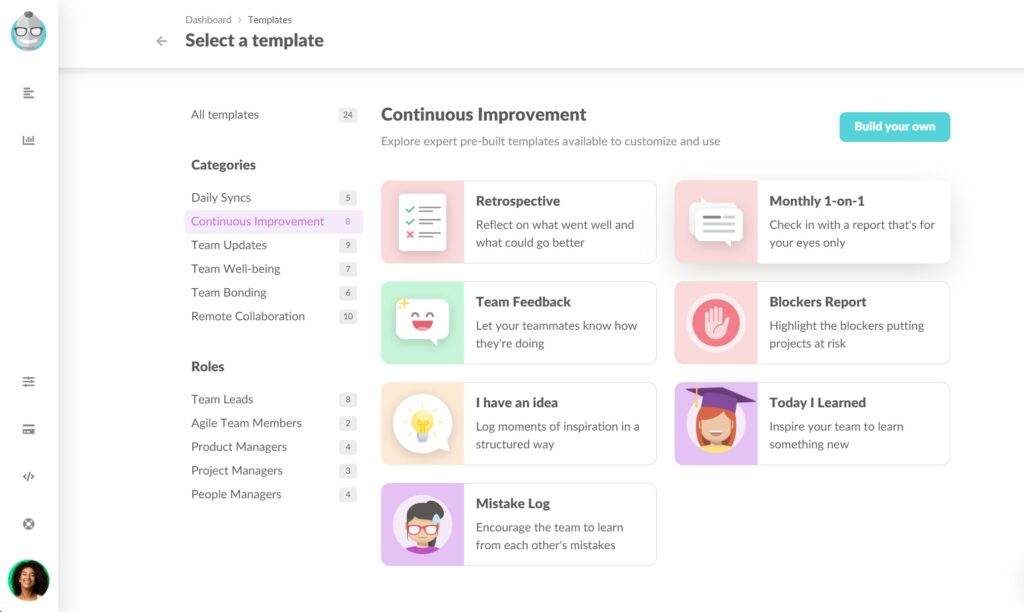One-on-one meetings with employees are extremely useful. When done right, 1-on-1’s boost solo and team productivity, improve retention, reduce the number of sick leaves, and even facilitate workplace innovation.
But the questions that you ask during your one-on-one meetings can make it or break it. The wrong questions in the wrong order will at best produce an illusion of an effective 1-on-1.
In the worst-case scenario, your employees will start treating 1-on-1s as routine status checks and you will reduce the value these meetings provide down to a minimum.
In this article, we’ll go through the well-proven 1-on-1 questions and how to ask them for the maximum positive impact on your team’s performance, morale, and happiness.
What to Keep In Mind When Asking One on One Questions
How Often Should You Conduct 1-on-1’s?
For maximum impact, 1-on-1 meetings should be conducted regularly, at least once a month. The regular schedule provides benefits for both employees and managers.
Employees gain security and alignment as they gather support from management, feel heard, and restore focus.
Managers gain historical data and can spot recurring issues or behavior patterns.
But when managers come unprepared for one-on-one meetings, these meetings tend to take a lot of time and don’t have much focus. Surely you could send the same list of questions every month and automate the whole process via Slack, Microsoft Teams, or email, but then you would lose the main value of actually interacting with your employees.
We can help you find a middle ground. Using Geekbot, you can automatically send a list of prep questions before the one-on-one meeting starts. After employees answer these questions directly in Slack, you can use their responses to better prepare for a one-on-one meeting: decide what to focus on and plan your meeting accordingly.
It’s also extremely valuable to record these meetings into short meeting notes to maximize their value. Notes allow you to track the progress of these meetings and analyze changes in employee responses over time.
With Geekbot you can automate the note-taking process from start to finish. Geekbot will automatically record all employee responses in Slack or MS Teams. This effortless approach ensures that you regularly gather information for 1-on-1 sessions without spending extra time.

Should You Use The Same Questions Or Different Ones Every Session?
There are both upsides and downsides to using the same questions for every one-on-one meeting with employees. The upside is that you can track how responses change over time and correlate this information with whatever happened in a given period.
Suppose your 1-on-1 includes the question: “On a scale from 1 to 5, how satisfied are you with the team progress during this week?”
For the last two months, Anna, one of your lead developers, provided “4” as an answer. This month, however, she estimated the team’s progress as “2”. Having this data you can follow up with Anna on the issue in detail. Without having the same question you might’ve even ignored the problem altogether.
At the same time, the repetitive questions might become a routine and employees might start to lose engagement and answer the 1-on-1 questions “on autopilot”. To prevent that, it’s advisable to mix up questions once in a while, adding new questions or modifying the old ones.

With Geekbot, for example, you can edit what questions your team members receive before their 1-on-1 sessions and easily add new questions or edit the old ones to make your 1-on-1 meetings more engaging and fresh.
How Long Should The One-on-One Meetings Be?
Your one-on-one meetings should be as long as they need to be, but make sure they last at least 30 minutes. If you go below that, employees might start treating 1-on-1 as routine status reports which greatly diminishes the value of these meetings.
If you are a manager and you struggle to allocate enough time for one-on-one meetings, consider two options.
First, change your mindset. These meetings are employee’s time they dedicate to the company and not vice versa. One-on-ones give managers a chance to hear their employees, encourage them, or guide them through challenges in the workplace. This, in turn, yields growth in productivity and employee loyalty, but only with the right mindset as a starting point.
Second, consider automated preliminary 1-on-1 sessions. No automated survey will replace a personal meeting with a manager, but automated pre-sessions allow you to make the most of your personal meetings while making them shorter and more engaging.
Make your one-on-one meetings more engaging and short by following these steps:
- Using Geekbot, automatically send a list of questions to your employees directly in Slack or MS Teams to identify issues that plague their productivity, gauge their morale, or affect their team relationships.
- Note that you can edit these questions and add new ones to better fit your goals.
- Your employees answer the questions privately in their Slack or MS Teams.
- Geekbot gathers all the responses in a specific channel of your choosing.
- Analyze employee responses and decide what you want to focus on during your next 1-on-1.
Many 1-on-1 meetings lose their value as they are too long and there are simply too many things both managers and employees want to discuss at the same time.
The mentioned approach helps managers to focus on specific issues that their employees voiced earlier, keeping the meeting shorter and more focused.
Now that we’ve covered how to make the most of your one-on-one meetings, let us share a list of one-on-one questions you can use during your 1-on-1s.
One-on-One Questions (Full List)
There are four main categories all one-on-one questions fall in:
- Work-related questions. Work questions explore employee’s struggles with their current work assignment, work priorities, and tools.
- Growth-related questions. Growth-related questions focus on short-term employee goals, long-term employee goals, ways and directions of growing, and growth inhibitors.
- Happiness and well-being questions. Questions in this category explore how happy your employees are at the workplace, and whether they have a solid work-life balance.
- Company-related questions. Company-related questions explore alignment between employees and the company goals, team culture, relationships with colleagues, and company values.
WORK 1-on-1 Questions
- Are there any resources or tools that you find particularly helpful?
- What tools and resources do you most often use?
- What mental blocks or thoughts get in the way of your success?
- Are you equipped with the tools and resources you need to do your job?
- What do you hope to learn from this project?
- How interesting is your work?
- Do you find it difficult to complete your work?
- What could prevent you from completing your tasks or projects on time?
- When it comes to your working routine, what part keeps you the most productive?
- Is the time allotted for each task too much, too little, or just right?
- Is your job challenging you?
- How are your projects or tasks coming along?
- Are you overworked or burnt out by your job?
- Are there any resources or tools that would help you in your job?
- Do you find any resources or tools to be useless?
- Are the projects or tasks you’re working on aligned with your goals?
- How will you measure the success of this project or your work?
- What activities do you spend the most time on?
- Are there any technologies that might make your workspace more efficient?
- Do you have a healthy work environment?
- How well do you understand your responsibilities?
- How do you prioritize your projects or tasks?
- How will your projects or tasks benefit you and the team, as well as the company?
- Do your colleagues use tools that you don’t know how to use or don’t have access to?
- How well informed are you to perform your job effectively?
- How will you ensure your success over the next four months?
- How important is a different work environment for different kinds of work?
- In addition to the projects you are currently working on, what other tasks do you wish to complete?
GROWTH 1-on-1 Questions
- How do you track your progress toward your goals?
- In order to achieve your goals, what kind of support do you need?
- What happened this month/quarter that helped or hindered you from meeting your goals?
- How realistic and attainable do you think your long-term goals are?
- What work do you have that is most relevant to your short-term goals?
- Do you have work that distracts you from short-term goals?
- To reach your goals, what can you do differently?
- Outside of this workplace, who helps you set goals for the future?
- What inspired your long-term goals?
- How do you envision yourself in two years? Ten years?
- Do you regularly think about your long-term goals?
- Which goals do you have for the upcoming month?
- What inspired your short-term goals?
- Do you have any goals for this month that will be challenging for you?
- Are there any obstacles keeping you from achieving your goals this month?
- What went wrong last month or quarter?
- What is your proudest accomplishment thus far this year?
- Where do you want to be in a year’s time?
- What obstacles hinder you from reaching long-term goals?
- Who is your go-to person for setting long-term goals?
HAPPINESS and WELL-BEING 1-on-1 Questions
- In what ways are you happy working for this organization?
- What role does time management play in your progress at work?
- How can I help you achieve a better work-life balance?
- Do you find it difficult to balance your work and personal lives?
- Is there anything in your personal life that negatively affects your work performance?
- What aspects of your job negatively impact your personal life?
- In the next two years, what would make you stay here?
- How did you become interested in this job?
- Is there anything about this company that would make you think of going somewhere else, either now or in the future?
- Are you able to satisfy both work and personal responsibilities?
- What keeps you in this position?
- Do you feel that you have a good work-life balance right now?
- During the next four months, what do you believe will be the keys to your success?
- Do you have any worries or concerns about your ability to succeed?
- What motivates you to stay at this company?
- Why did you choose this organization?
- What can we do to improve our teamwork?
- Do you want your workplace to have more team-building activities?
- What makes you happy about your job?
- Whenever people leave our organization, why do you think they leave?
COMPANY 1-on-1 QUESTIONS
- Are there ways we can accomplish our mission or live our values better?
- How can we improve our organization’s mission and value statements?
- As the company’s owner, what would you do differently?
- What are our obvious weaknesses?
- What is one suggestion you might have that would assist us in improving our product or service?
- To what extent do you believe our company has a social responsibility to the community, both locally and internationally?
- What one thing would you change about our company?
- What can we do to compete better in the market, in your opinion?
- Can you describe our organization’s mission and values?
- What causes are most meaningful to you?
- As a company, what are some ways we could be more innovative or creative?
- Which are the primary risks or problems we should address with our products and services?
- What questions do you have about the company’s values or mission?
- What role does your job play in the overall company mission?
- Does your personal value system align with our company’s values?
- What company values resonate better or worse with you?
We hope these questions will help you connect with your employees and build a healthy and strong team culture.
Geekbot allows you to send these questions automatically to your employees, automatically organizes their feedback, and even applies NLP-analysis to their responses.
Grab our 10-member free plan and conduct effective asynchronous meetings, stand-ups, and surveys without taking precious time from you and your employees!
Frequently asked questions
What are good questions to ask employees in one on one meetings?
There are two types of questions to ask during one on one meetings: open-ended questions and short response questions. Open-ended questions facilitate deep discussions and often lead to profound discussions with your employees. Short response questions facilitate either binary Yes/No response or a rating and are perfect for gathering historic data. Combine both types of best results.
What is the purpose of one on one meetings with employees?
One-on-one meetings with employees serve several purposes at a time. First, they establish a direct connection between leadership and employees, helping both parties to understand each other better and feel heard. Second, they allow managers to praise employee’s work and motivate them to do their best job. Lastly, they help unearth issues that affect both short-term and long-term company goals.
How often should you have one on ones with employees?
One-on-one meetings with employees should be conducted at least once a month or once a quarter. You can facilitate even more frequent 1-on-1 as long as they stay short and productive to both managers and employees involved.



